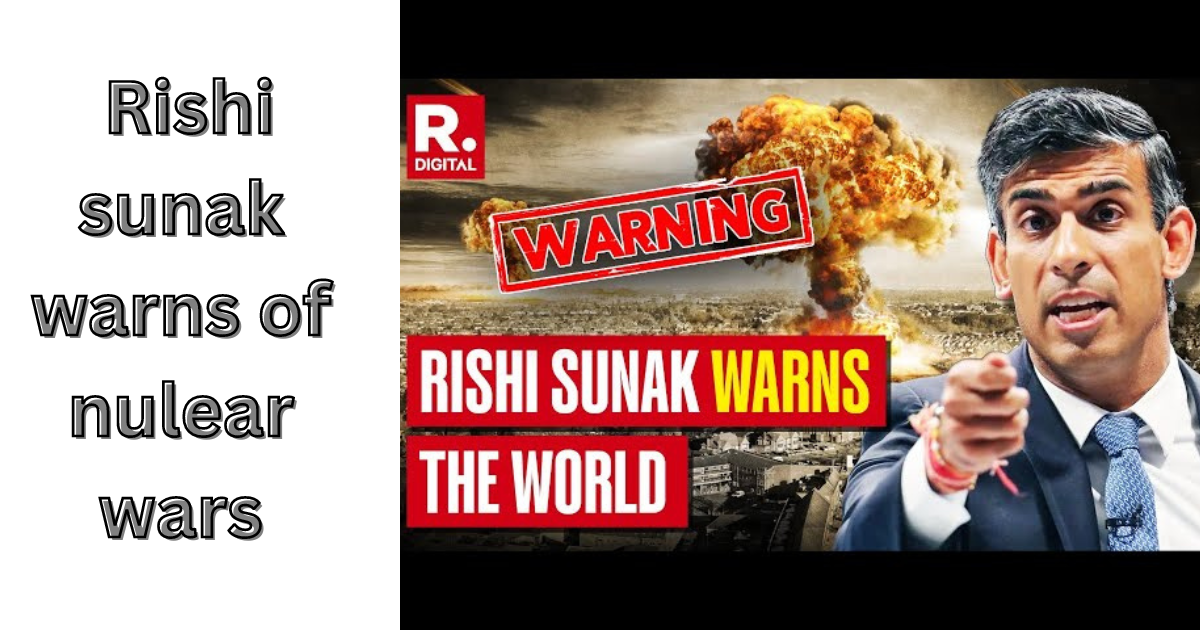Introduction
In recent statements, British Chancellor Rishi Sunak has issued stark warnings about the potential for nuclear wars. Such pronouncements have sparked widespread concern and debate about the current geopolitical landscape and the risks of escalating conflicts.This article delves into Sunak’s warnings, explores the underlying factors contributing to nuclear tensions, and discusses the potential consequences of such conflicts.
1. Risk of Dangerous Nuclear Escalation
Rishi Sunak’s recent warnings regarding the threat of nuclear conflict have despatched shockwaves through diplomatic circles. With tensions already strained among nuclear-armed countries, the chance of dangerous escalation looms large at the horizon.
2. Increased Threat from Extremists
In light of Sunak’s alarming statements, protection analysts are pointing to the increased chance posed via extremist agencies looking for to collect nuclear abilties. The ability for non-country actors to instigate a catastrophic nuclear event is a troubling truth that can not be overlooked.
3. Politics Latest: Rwanda Deportation Law Disapplied by Court in Northern Ireland

While interest is targeted on Sunak’s dire predictions, other political traits keep to spread. In a shocking flip of events, the deportation law related to Rwanda has been disapproved with the aid of a court docket in Northern Ireland, adding every other layer of complexity to the political landscape.
4. Analysis: Rishi Sunak Pushes the Nuclear General Election Button
As Rishi Sunak amplifies his warnings of nuclear war, political analysts are dissecting the potential impact on upcoming elections. The rhetoric surrounding nuclear war has turn out to be a principal subject, raising questions on how it’ll have an effect on voter conduct and shape marketing campaign strategies.
5. Labour MP Alison McGovern Brands Unemployment Rates Damning
Amidst the backdrop of nuclear anxieties, Labour MP Alison McGovern has drawn interest to the damning unemployment costs plaguing the country. While the point of interest may be on geopolitical instability, domestic troubles consisting of economic complication can’t be unnoticed.
Rishi Sunak’s latest statements have reignited the debate surrounding nuclear proliferation and the ominous opportunity of global conflict.
Key Points:
- Rishi Sunak’s Warnings: Rishi Sunak, the Chancellor of the Exchequer, has issued alarming warnings approximately the developing threat of nuclear war.
- Geopolitical Tensions: Sunak’s statements come amidst escalating tensions among nuclear-armed countries, elevating worries approximately the capacity for a catastrophic nuclear trade.
- Threat from Extremists: Analysts warn of the accelerated hazard posed by means of extremist organizations searching for to collect nuclear abilties, adding to the complexity of the state of affairs.
Table: Statistics on Nuclear Proliferation and Global Security
| Statistic | Value |
|---|---|
| Number of Nuclear-Armed Nations | 9 |
| Estimated Global Nuclear Warheads | 13,080 |
| Nuclear Stockpiles by Country (Top 3) | United States, Russia, China |
| Estimated Nuclear Explosive Yields (Top 3) | 1,000, 800, 250 kilotons |
| Number of International Arms Control Treaties | 14 |
conclusion

In conclusion, Rishi Sunak’s warnings of nuclear warfare function a stark reminder of the fragility of worldwide peace and protection. As tensions amplify among nuclear-armed nations and the threat of extremist agencies obtaining nuclear talents looms big, the arena stands at a critical juncture.
The current political tendencies, together with the disapplication of the Rwanda deportation law in Northern Ireland and Labour MP Alison McGovern’s condemnation of unemployment costs, underscore the multifaceted demanding situations dealing with society.
faqs

1. How credible are Rishi Sunak’s warnings of nuclear war?
- Answer: Rishi Sunak’s warnings are based on intelligence assessments and expert analysis of global security threats, making them a credible cause for concern.
2. What steps can governments take to prevent nuclear conflict?
- Answer: Diplomatic initiatives, arms control treaties, and confidence-building measures are essential tools for mitigating the risk of nuclear war.
3. How can individuals contribute to nuclear disarmament efforts?
- Answer: Individuals can advocate for peace, support nuclear non-proliferation efforts, and hold their leaders accountable for promoting dialogue and diplomacy.
4. What are the potential consequences of nuclear war for the environment?
- Answer: Nuclear war could have devastating environmental effects, including radioactive contamination, destruction of ecosystems, and long-term climate disruption.
5. Is there hope for a peaceful resolution to current geopolitical tensions?
- Answer: While the situation remains precarious, diplomatic engagement and multilateral cooperation offer hope for de-escalating tensions and preventing nuclear conflict.




